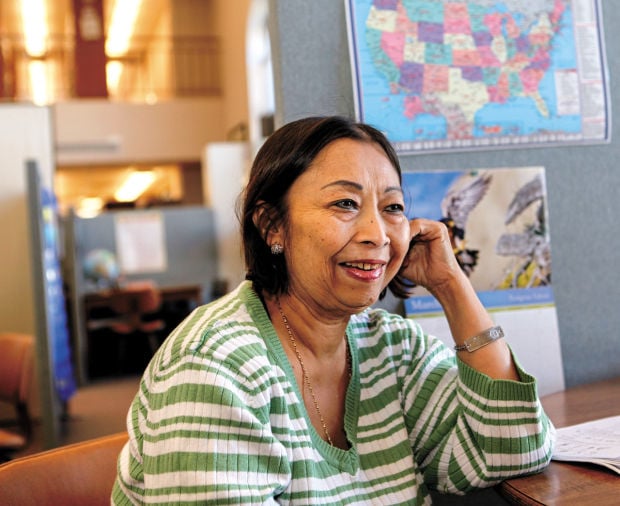Sangvar Tan
Survivor of Cambodia's darkest days finds solace in Longview library
Her little brothers starved to death in Cambodia in the 1970s, and her father was executed by the Khmer Rouge.
She battles diabetes and lupus and spends 12 hours a day hooked to a dialysis machine.
But
Longview resident Sangvar Tan, 62, still comes to the Longview Public
Library for an hour twice a week for tutoring in math, reading and
writing and hopes to one day earn her GED.
“I like to come here.
They help me all the time,” Tan said last week after her tutoring
session in the library’s Project Read adult literacy section. “When I
stay home, I don’t know what to do, and I’m still very sick.”
“They can come here and get help,” she said.
Tan
was born in Cambodia in 1962. Within a decade, her country — bordered
by Thailand, Laos and Vietnam — would be ripped apart by civil war. When
the Khmer Rouge took over the government in 1975, the communist group
of guerilla fighters executed her father, a customs officer, during a
purge of government officials and intellectuals. Aiming to build a
farming-based communist utopia, the Khmer Rouge destroyed food sources,
evacuated cities and forced Cambodians to the countryside, resulting in
widespread famine and starvation.
In 1977, Tan’s brothers, ages 6 and 8, died “because there was no food to eat,” she said.
In
all, as many as three million people died during the Cambodian
genocide, which lasted until the Khmer Rouge’s fall from power in 1979.
That
year, the 17-year-old Tan, her two sisters and her mother escaped to
Thailand on foot. There, her mother sold pineapples and bananas, and Tan
earned money hauling water from the river in two buckets suspended from
a stick across her shoulders.
After two years in Thailand, the
family moved to the Philippines, where Tan attended school and learned
some English (she’d had only four years of schooling in Cambodia). When
Tan was 21, her mother obtained a refugee visa to the United States, and
they moved to Jacksonville, Fla., in 1982.
Tan soon decided to
visit a friend in Longview for a few months. In Longview, she met her
future husband, an immigrant named Chun Chan Tan who arrived in Longview
in 1975 and worked at Longview Fibre. The couple brought Sangvar Tan’s
mother and sister to Longview and then married Dec. 24, 1982. They had
four daughters.
Chun Chan Tan, who was born in Cambodia to Chinese
parents and spoke Chinese, English and Cambodian, encouraged his new
wife to take English classes at LCC. After she earned her citizenship in
1995, Sangvar Tan heard about the Longview Library’s adult literacy
programs and began studying math with a tutor.
If she hadn’t
gotten sick, Tan said she would have earned her high-school equivalency
diploma a long time ago. But now her English tutoring is even more
necessary — she needs to be able to understand her doctors’
instructions.
Athough her neighbors, Linda and Paul Ratte, have
been helping her, Tan increasingly must rely on herself. Chun Chan Tan
died in 2010 of liver problems, and her last remaining daughter at home,
21-year-old Christina, soon will begin school at the University of
Washington, where she will study physical therapy.
Only two of
Tan’s daughters speak fluent Cambodian. The younger daughters understand
some things in Cambodian but reply to Tan in English because they don’t
speak much of the language.
In her 20s, Tan was diagnosed with
lupus, an autoimmune disease, and then with Type I diabetes. Later, she
was diagnosed with Type II diabetes, requiring insulin injections. Three
years ago, she had a cancerous kidney removed. Now she undergoes
dialysis — a process for filtering waste and extra water from the blood —
seven days a week.
“If someone doesn’t speak English, it’s hard to do dialysis,” Tan said. “You don’t know how to read directions.”
In December, her name will be added to a kidney transplant list.
But
meanwhile, she’ll continue coming to the library twice a week when she
feels well enough to get out of bed. It makes her happy to see her
tutors Tami Tack and Diane Strozyk and adult literacy coordinator
Elizabeth Partridge, she said.
Also, Tan added, “I don’t want to stay home. I watch TV too much.”


